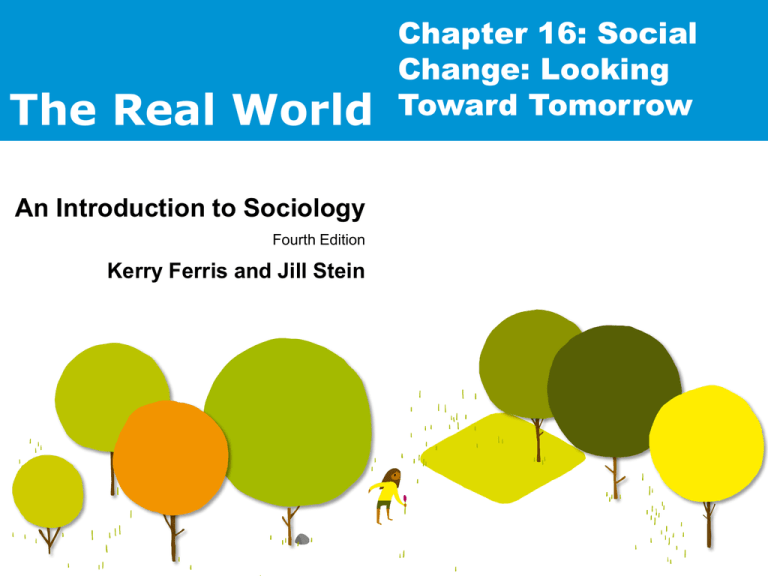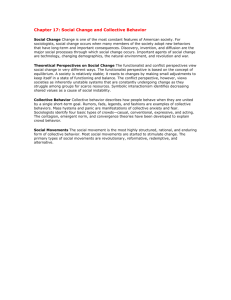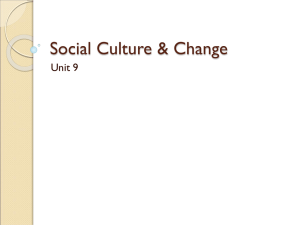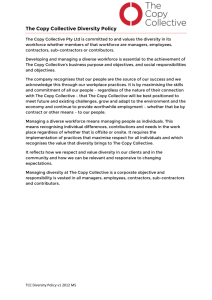Chapter 16: Participation Questions
advertisement

The Real World An Introduction to Sociology Fourth Edition Kerry Ferris and Jill Stein Chapter 16: Social Change: Looking Toward Tomorrow What Is Social Change? • Sociologists define social change as the transformation of a culture over time. • This can be: • deliberate, intended • unplanned, unintentional • Some changes are more controversial than others. 2 What Is Social Change? (cont’d.) • There are several ways that social change can occur: • Major physical event (hurricanes, earthquakes, or volcanic eruptions) • Demographic factors (for example, the aging of baby boomers) • Discoveries and innovations (fire, the wheel) 3 What Is Social Change? (cont’d.) • The most important contributions to social change have been made through collective action (like the civil rights movement). 4 Collective Behavior • Collective behavior: a group or crowd of people who form together to take action toward a shared goal. 5 Theories of Collective Behavior • Contagion theory: Individuals who join a crowd or mob become “infected” by a mob mentality and lose the ability to reason. 6 Theories of Collective Behavior (cont’d.) • Emergent norm theory states that: • Individual members of a crowd make their own decisions about behavior. • Norms are created through others’ acceptance or rejection of these behaviors. 7 Types of Collective Behavior Collective behavior can take three different forms: • Crowd — temporary gathering of individuals (spontaneous or planned) with a common focus. • Riot — continuous disorderly behavior by a group of people that disturbs the peace and is directed toward other people or property. • Mass behavior — large groups of people engage in similar behaviors without necessarily being in the same place. 8 Examples of Mass Behavior • Fads—interests or practices followed enthusiastically for a relatively short period of time. • Fashion—the widespread custom or style of behavior and appearance at a particular time or in a particular place. 9 Examples of Mass Behavior (cont’d.) • A social dilemma happens when a behavior is rational for an individual but it can lead to collective disaster when practiced by many people. 10 Specific Social Dilemmas • Tragedy of the commons—many individuals overexploit a public resource and deplete or degrade it. • Public goods dilemma—individuals must contribute to a collective resource, even though they might not benefit from it. 11 Collective Behavior (cont’d.) • A social movement refers to any social group with leadership, organization, and an ideological commitment to promote or resist social change. 12 Collective Behavior (cont’d.) • Armand Mauss identified the four stages that social movements tend to go through. 1. 2. 3. 4. Public defines problem People organize Movement becomes bureaucratized Movement begins to decline 13 Emergent Social Movements: Promoting and Resisting Change • Because society is constantly changing, new social movements and different opportunities for activism (any activity intended to bring about social change) are constantly emerging. 14 Types of Social Movements • Some emerging social movements are regressive (attempt to resist social changes, maintain the status quo, or go back to an earlier form of social order) • Others are more progressive (efforts to promote forward-thinking social change) 15 Technology and Social Change • Sociologists have developed a number of theories to explain the role of technology in social change. One common characteristic of these theories is an emphasis on technological determinism (the idea that technology plays a defining role in shaping society). 16 Technology and Social Change (cont’d.) • Cultural lag refers to the time between changes in material culture or technology and the resulting changes in the broader culture’s relevant norms, values, meanings, and laws. • Cultural diffusion refers to the spread of material and nonmaterial culture to new cultural groups regardless of the movement of people. 17 Technology and Social Change (cont’d.) • Cultural imperialism refers to cultural influence caused by adopting another culture’s products rather than by an imposing military force. • Cultural leveling is the process by which societies lose their uniqueness and become increasingly similar. 18 Implications for a Postmodern World • Modernity refers to the social conditions and attitudes characteristic of industrialized societies, including the decline of tradition, an increase in individualism, and a belief in progress, technology, and science. 19 Implications for a Postmodern World (cont’d.) Postmodernity refers to the social conditions and attitudes characteristic of postindustrialized societies, including a focus on the production and management of information and skepticism of science and technology. 20 Chapter 16: Participation Questions Have you ever been part of a group that was working toward a shared goal? a. yes b. no 21 Chapter 16: Participation Questions Have you ever engaged in an act of activism (an activity intended to bring about social change)? a. yes b. no 22 Chapter 16: Participation Questions Do you have a Facebook account? a. yes b. no 23 Chapter 16: Participation Questions Have you traveled abroad? If so, did you notice any American influence on the local culture? a. I haven’t traveled abroad. b. I have traveled abroad but didn’t see much American influence. c. I have traveled abroad and I saw a little American influence. d. I have traveled abroad and I saw a lot of American influence. 24 This concludes the Lecture PowerPoint presentation for Chapter 16 © 2014 W. W. Norton Co., Inc. The Real World AN INTRODUCTION TO SOCIOLOGY 4th Edition Kerry Ferris and Jill Stein 25




